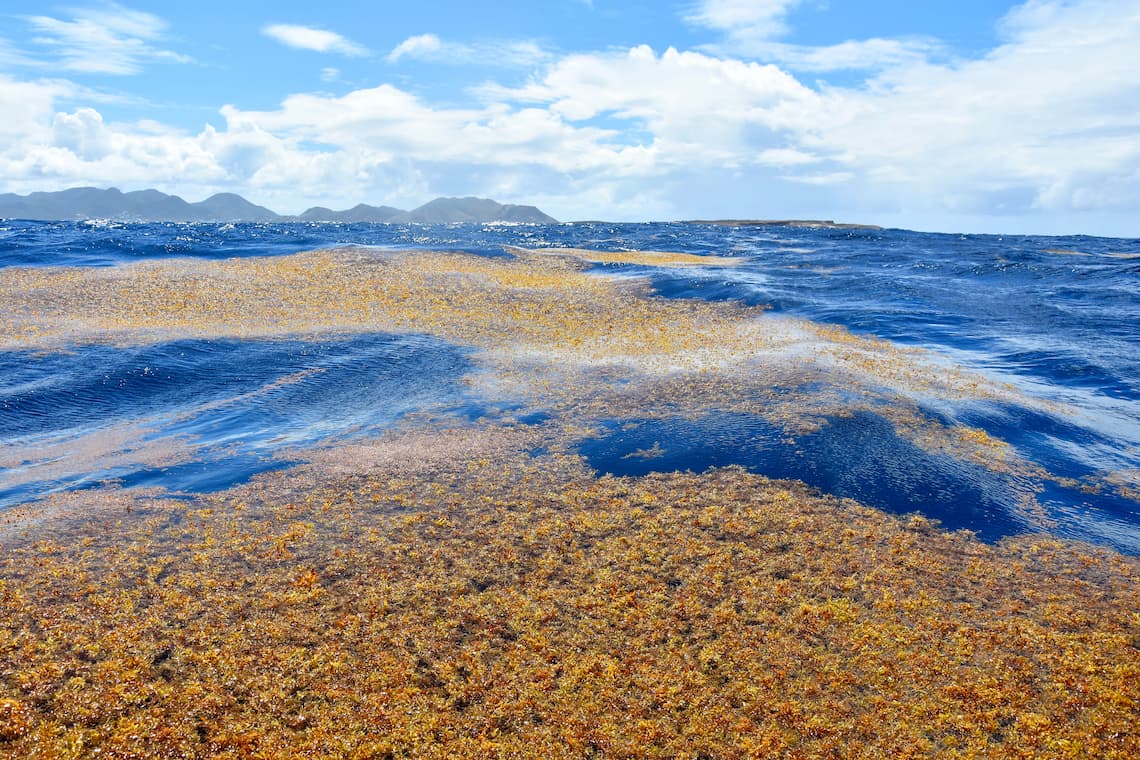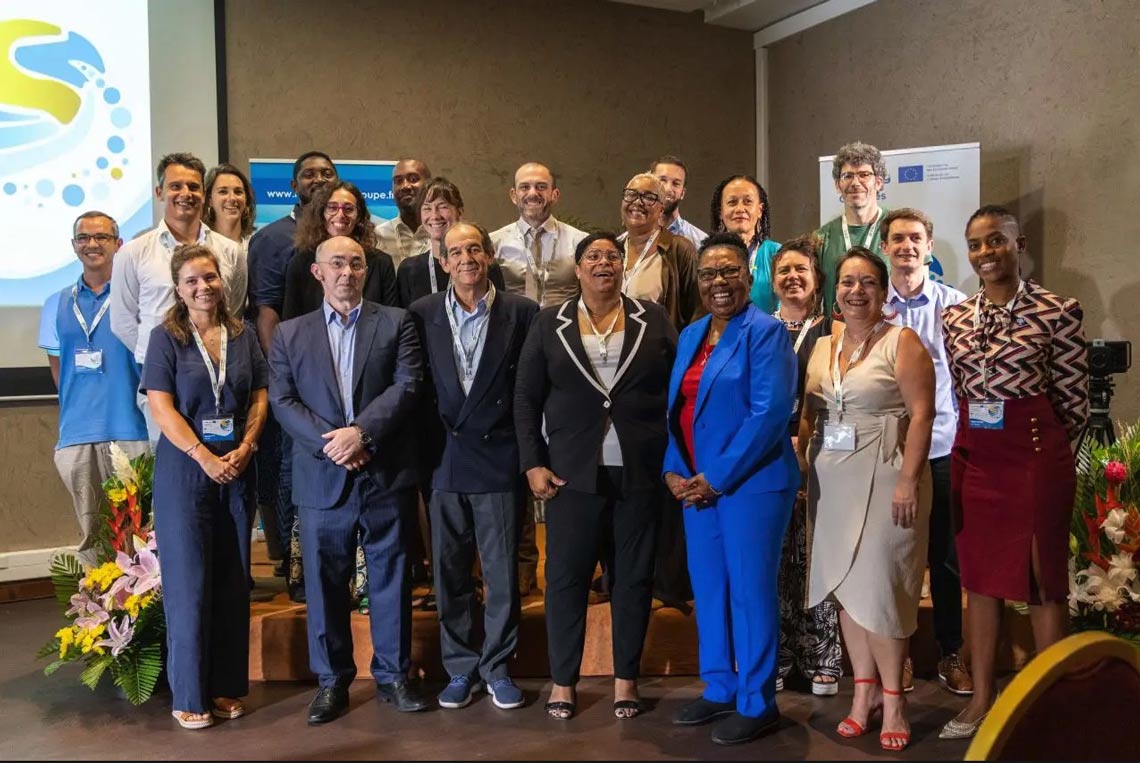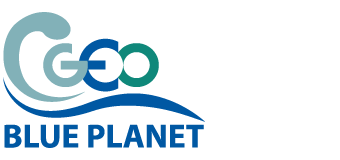
Out in the western Atlantic, vast mats of golden-brown seaweed drift across the ocean surface, providing a haven for countless marine species. This floating forest of Sargassum is a vital part of the marine ecosystem, but warming waters and a flow of nutrients have seen Sargassum periodically form huge blooms that spread across the tropical Atlantic, Caribbean Sea, and Gulf of Mexico. These Sargassum blooms are a menace, choking beaches, disrupting fisheries, threatening human health, and impacting tourism-dependent economies. We can’t stop Sargassum blooms from happening, but we can monitor Sargassum so that coastal communities and decision-makers can prepare for the next bloom.
Monitoring and early warning
Bringing together regional and international partners, the GEO Blue Planet Sargassum Working Group is supporting the development of monitoring and early warning systems for Sargassum across all affected regions of the Tropical Atlantic. In particular, the Sargassum Working Group focuses on identifying gaps in geo-referenced data and information (data and information with a location attached) that can be used for monitoring and forecasting Sargassum. Equally important, they are working to advance scientific and technical cooperation to support the implementation and development of monitoring and forecasting systems, promoting their use and the use of FAIR (Findable, Accessible, Interoperable, and Reusable) data. Ensuring data is FAIR means it can be easily discovered, shared, and integrated across platforms and regions.
One of the Working Group’s key activities is the Sargassum Information Hub. Created in collaboration with partners including the IOCARIBE of IOC-UNESCO, AtlantOS, and the Atlantic International Research (AIR) Center, the Hub acts as a centralised point for the latest information on Sargassum, Sargassum-related news and events, a project directory, and Sargassum monitoring and forecasting information, and more. Currently, the Hub is undergoing an update. Updates will include more information on the value chain of Sargassum, such as harvesting, storage, and valorisation of Sargassum, and a new directory dedicated to the different actors in the Sargassum value chain.

Second phase of SARG’COOP launched
In 2019, the Caribbean Sargasso programme (SARG’COOP) was launched to enhance Caribbean territories’ preparedness and resilience to Sargassum blooms. Among the programme’s achievements was establishing a Caribbean centre for the prevention and monitoring of Sargassum algae. The first phase of the project ended in 2023, but in March 2025, the second phase (SARG’COOP II) was launched in Guadeloupe.
The second phase, which will run until 2027, will focus on four key areas – scientific research to improve our knowledge and understanding of sargassum dynamics, improving detection and tracking of sargassum blooms, developing better management approaches to Sargassum, and exploring ways to repurpose Sargassum sustainably.
GEO Blue Planet will be participating in many different activities. In collaboration with Mercator Ocean International, CLS, a French Space Agency CNES and CNP subsidiary specialising in Earth Observations will deploy coastal current tracking devices in nearshore waters. The data collected by these devices will help us better understand the movement of waters, which play a critical role in transporting Sargassum towards the coast, ultimately improving our forecasts.
On a separate activity with GEO Blue Planet, Mercator Ocean International is developing a decision support tool that harnesses satellite data and oceanographic models to predict Sargassum blooms. The tool, which is currently in beta, features an interactive map that visualises drift and density forecasts across the Tropical Atlantic. The tool will help researchers and coastal managers anticipate Sargassum influxes and enhance their preparedness and response strategies.
Other SARG’COOP II activities GEO Blue Planet will support include the inclusion of a dedicated SARG’COOP Community Cluster in the Sargassum information Hub, which will act as a central repository for all of the project’s information and bring the SARG’COOP community together and provide scientific insights as and when needed. The decision-making tool and a dedicated SARG’COOP project page will also be hosted on the Sargassum Information Hub.
Image credit: VELY Michel/Wikimedia (CC BY-SA 4.0)
Additional information
- Learn more about the GEO Blue Planet Sargassum Working Group: https://geoblueplanet.org/sargassum/
- Learn more about the Sargassum Information Hub: https://geoblueplanet.org/the-sargassum-information-hub/
- Visit the Sargassum Information Hub: https://sargassumhub.org/
- Learn more about SARG’COOP: https://sargcoop.org/
- Watch a short video introducing SARG’COOP II (LinkedIn – in French): https://www.linkedin.com/posts/region-guadeloupe_sargasses-environnement-sargcoop2-activity-7311162395991633920-pZAG
- Visit the decision support tool (currently in beta): https://sargassum-viewer.lab.dive.edito.eu/
- Learn more about the Earth Observation value chain for Sargassum: https://www.eu4oceanobs.eu/wp-content/uploads/2022/12/Use_case_Sargassum_Dec2022.pdf
